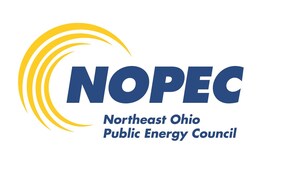SOLON, Ohio, Aug. 9, 2019 /PRNewswire/ -- Ohio consumers have saved a total of nearly $24 billion – or about $3 billion per year – over the past 8 years by choosing their electricity suppliers in a deregulated market, but efforts by the state's investor-owned utility companies are chipping away at those savings as the threat to reregulate energy markets intensifies, say researchers at The Ohio State University and Cleveland State University.
"Competitive markets have proven to be a powerful tool to deliver value to Ohio's ratepayers," according to the study by The Ohio State University's John Glenn College of Public Affairs and Cleveland State University's Maxine Goodman Levin College of Urban Affairs. But the study adds: "Efforts to undermine the efficiency of these markets, like subsidies for uneconomic generating facilities, are a threat to Ohio's economic development and wellbeing. Any attempt to derail competitive generation markets would cause significant harm to all of Ohio's electric consumers and Ohio's economy."
"In fact, attempts are heating up to derail competition, eliminate consumers' rights to choose their energy supplier and undermine years of progress on the energy choice front," said Chuck Keiper, Executive Director of the Northeast Ohio Public Energy Council (NOPEC).
That's why NOPEC, which commissioned the first study on the effects of deregulation in 2015, asked the same researchers to update the findings and validate projected savings, Keiper said.
NOPEC is a nonprofit council of governments that works cooperatively to provide a competitive environment for energy and cost savings for the nearly 900,000 residents and small businesses it serves in more than 230 communities in 17 counties throughout Ohio.
"The first study, and now this update, provide the hard evidence to support what so many of us presumed – that being able to choose means consumers save billions of dollars each year," Keiper said. "Competition means the smartest, most capable and efficient energy companies thrive. And a competitive electricity market leads to more secure energy industry jobs because these companies succeed based on their performance – not because they're propped up by government subsidies and regulation or have a monopoly on electricity generation," Keiper added.
The 2015 study estimated that Ohio consumers would continue to save about $3 billion per year in a deregulated market. The updated study confirms that since 2011, Ohio consumers have saved $23.9 billion as a result of deregulation, and savings are expected for the near future at around $3 billion per year. The study's authors, though, issued warnings about the potential negative impact the actions of investor-owned utilities and their legislative lobbying efforts could have on those projected savings, specifically:
- Lawmakers and the big utilities continuing to add costly "riders" to customers' bills – charges that consumers must pay to support the utilities' outdated generating facilities. The study shows that between 2016 and 2018, the portion of Ohio electric bills made up of mandated and regulated charges to help bolster utility companies' profits increased from 35% of the total bill to 43%.
- The utilities efforts to begin lobbying lawmakers to force energy aggregators, brokers and commercial retail electric services out of the Ohio market, easing pressure on the utilities but resulting in "price increases that will be unchecked by competition," the study predicts.
- The loss of non-financial benefits that flow from a deregulated market in which energy suppliers compete for customers by more efficiently allocating resources, lowering the cost of power production and providing more options for renewable energy.
"The cumulative effect is higher profits for the legacy power producers, increased costs for consumers and diminished economic prospects for Ohioans," the study says. "Protected power generation is an anti-economic development policy."
The study also reinforced that deregulation had been the goal of Ohio's utilities – until they realized their outdated generating plants couldn't compete. The years since have seen the utilities lobbying the Public Utilities Commission of Ohio (PUCO) and legislators for anti-competitive measures like mandated charges and, ultimately, a return to a regulated market where profits are guaranteed.
"Deregulation, once championed by investor-owned utilities, now faces challenges from these same stakeholders who have been regularly petitioning both the PUCO and the Ohio General Assembly for subsidies to bail out their loss-making, aging, uncompetitive generation fleets," the study concludes. "These efforts, if successful, will erode the significant benefits and financial savings that Ohio's consumers have realized as a result of deregulated electricity generation markets."
Keiper added that individual businesses and consumers have made it clear that they want a competitive electricity supplier market to continue. One statewide poll showed that nearly 79 percent of Ohio voters would oppose any legislation that did away with a consumer's ability to shop for power suppliers.
"We can't go backwards," Keiper said. "Moving forward, we have to continue to tell our legislators, loud and clear, that competition works. A return to regulation would be bad for Ohio residents and businesses and, ultimately, will make the cost of living and doing business here unattractive compared to our peer states."
To read the full study and to learn more about how to support energy choice, go to www.saveenergychoiceohio.org.
ABOUT NOPEC
NOPEC (Northeast Ohio Public Energy Council) is a non-profit group of over 230 communities in 17 Ohio counties that negotiates lower utility rates for its members. As Ohio's largest public retail energy aggregator, NOPEC buys gas and electricity in bulk to help lower customers' utility bills. Since 2001, NOPEC has saved residents and businesses over $300 million and awarded more than $28 million in energy-efficiency grants to NOPEC member communities. For more information about NOPEC, visit www.nopec.org.
SOURCE NOPEC

Related Links
WANT YOUR COMPANY'S NEWS FEATURED ON PRNEWSWIRE.COM?
Newsrooms &
Influencers
Digital Media
Outlets
Journalists
Opted In





Share this article